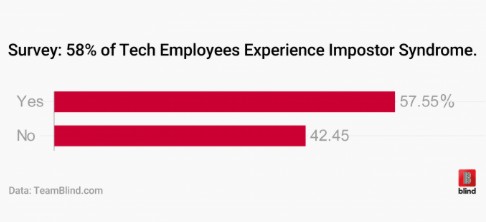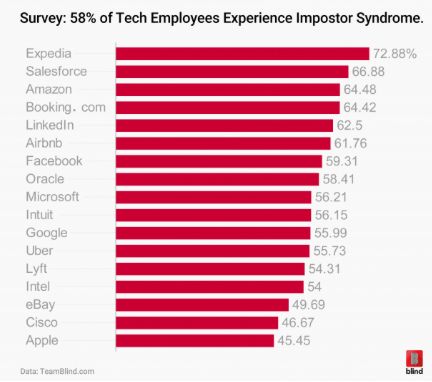| Impostor Syndrome Prevalent In High-Tech Workplace |
| Written by Janet Swift | |||
| Friday, 14 September 2018 | |||
|
Do you ever feel like a fraud in your work. If so, you are far from alone. A poll conducted by the anonymous chat board, Blind, discovered that 58% of tech professionals suffer from feelings of inadequacy despite evident success. The term "Imposter Syndrome" was coined in 1978 and refers to a feeling of: "phoniness in people who believe that they are not intelligent, capable or creative despite evidence of high achievement.” If you aren't already familiar with it, Blind describes itself as "an anonymous community app for the workplace" where employees can talk about topics including compensation, salary, company environment and workplace issues like sexual harassment. While Blind doesn't disclose its total user base, it is used by more than 50,000 companies of which the most prominent are Microsoft (40K+ users), Amazon (25K+) and Google (10K+). Between August 27, and September 5, 2018, Blind, which regularly conducts one-question surveys, asked its users: "Do you suffer from Impostor Syndrome?" According to the blog post by Kim presenting the results of the poll, it was a question from a Salesforce employee that motivated the survey:
In only three companies - Apple, Cisco and eBay, did fewer than half the respondents report imposter syndrome. However, perhaps the 58% overall rate recorded isn't that extreme as a 2011 study reported in the Journal of Behavioral Science quoted an earlier finding that: 70% of people will experience at least one episode of this Impostor Phenomenon in their lives. The 2011 paper notes that overworking is a component of the Imposter cycle and that is related to achievement-related tasks where fear of failure causes anxiety. These factors are commonplace in the high tech workplace so maybe Imposter Syndrome is to be expected. Hopefully, knowing that they are far from along, and indeed among a sizable majority, will help people shrug of their feeling of phoniness and accept that they are indeed fully competent and make genuine achievements. Source: xkcd, a webcomic of romance, sarcasm, math, etc.
More Information58 percent of tech workers feel like impostors
Related ArticlesComputer Programmers - Relatively Sleep Deprived
To be informed about new articles on I Programmer, sign up for our weekly newsletter, subscribe to the RSS feed and follow us on Twitter, Facebook or Linkedin.
Comments
or email your comment to: comments@i-programmer.info |
|||
| Last Updated ( Friday, 14 September 2018 ) |

 A total of 10,402 users responded to the survey and companies with the greatest numbers of participants are included in a summary chart. Expedia had the most extreme result with 73% of its employees experiencing Imposter Syndrome, followed by Salesforce (67%), then Amazon (64%).
A total of 10,402 users responded to the survey and companies with the greatest numbers of participants are included in a summary chart. Expedia had the most extreme result with 73% of its employees experiencing Imposter Syndrome, followed by Salesforce (67%), then Amazon (64%). 


